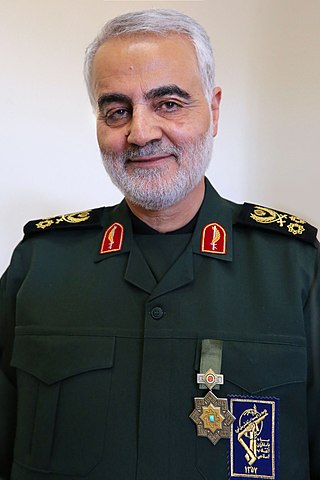Executive
Trump and the General
Killing General Soleimani was a right act because his nation was at war with America. But America would have fewer problems by withdrawing from the field.

Hello, this is Darrell Castle with today’s Castle Report. Today I will be talking about the assassination of Iranian General Qassem Soleimani by a Hellfire missile fired from a U.S. drone. The attack, apparently on President Trump’s personal orders, occurred at the Baghdad airport. The General had just arrived on a flight from Tehran, Iran. He was there to meet with an Iraqi named Abu Mahdi al-Muhandis. That worthy had personally planned and led the blockade attacks against the U.S. Embassy. Keep in mind that the situation is fluid and changing as I write.
Background
A brief background to this story is in order. First, an American civilian contractor was killed and several U.S. soldiers wounded in a rocket attack on an Iraqi base near KirKuk in Iraqi Kurdistan. In response, President Trump authorized airstrikes on five camps of the attackers. President Obama’s State Department designated the targeted organization as a terrorist group in 2009. The group has repeatedly attacked U.S. forces in Iraq.
In retaliation for the U.S. bombing, protesters led by the Iraqi Muhandis, blockaded and attacked the U.S. embassy in Baghdad. Attacking embassies is a common tactic used by Middle East groups, who believe they are immune from retaliation. Remember the takeover of the U.S. embassy in Tehran in 1979. Remember also the siege of the U.S. embassy in Benghazi, Libya during President Obama’s administration.
The general didn’t have a chance
President Trump tweeted out a threat, as he termed it, and said that Iran would pay a very big price. The Supreme Leader of Iran Ayatollah Khamenei taunted President Trump on New Year’s Day. He said “there is not a damn thing you can do.” It turns out that the Ayatollah was wrong. When his top General got off his airplane and got in the car with Muhandis, they did not make it off the tarmac. A Hellfire missile from a U.S. drone obliterated them.
I suppose the Ayatollah confused President Trump with Presidents of his past dealing. But apparently Trump wanted to send him a Hellfire message that one could read as:
I’m not Jimmy Carter and I’m not Barack Obama, and when you kill one of us I will kill you back.
End of the matter?
The Iranians had to retaliate, of course, so they sent some rockets into Iraqi bases where U.S. troops were stationed. They apparently killed no one but appeared strong and unafraid. So, they killed some of ours and in retaliation, Trump killed some of theirs. They then retaliated for that, although in a benign way designed to not require further retaliation. The President spoke to the nation and accepted their quid pro quo as the end of it as far as he is concerned.
Did Trump work it out in advance? Maybe
If the Iranian retaliation was planned and accepted in advance, that would not surprise me. Rumors are floating around of a back channel note through the Swiss embassy to Tehran. Allegedly that note said that proportionate retaliation would be acceptable. I assume that means a military and not a civilian target. I’ll be surprised if this tit for tat goes any further than that. I think Trump wants to use it as an opportunity to do what he promised in his campaign he would do. Which is get the U.S. out of the eternal war business. So, perhaps a quiet deal with Iran is in place, and everyone avoids embarrassment. That’s just a guess on my part but it looks plausible.
I admit thought that this idea of pre-planned withdrawal looks shaky now, considering the massive buildup of U.S. forces in the Gulf Region, so we will see.
A good time to leave?
In response to all this fighting, the Iraqi Parliament met and voted to invite U.S. troops to leave Iraq immediately. Perhaps the President will accept their invitation and pull the U.S. out of Iraq as he promised to do in his 2016 campaign. Perhaps he will do that, but if so, it won’t solve the problem unless they come home completely. Remember that in 2014, the U.S., under President Obama, went back into Iraq and Syria to assist those countries in their resistance to ISIS. Now that ISIS is defeated and its leader dead, the mission is complete and over. So leaving would be perfectly understandable.
That is enough background to ask the question; was the killing of General Solimani and his Iraqi right hand man, Muhandis justified. Is it OK for a U.S. President to order targeted killings on the other side of the world? Political assassination is an act of war but remember that Iran declared eternal war on the United States, the Great Satan, in 1979. Generals are fair game in war since they wear uniforms just like their soldiers.
To business: did Trump do right in killing the general?
I remind you of when President Obama used to meet every Tuesday morning with his staff and by video conference with military and intelligence people from around the world to go over that week’s kill list, which contained over one hundred names. The President would then personally decide who would die and who would live another week. He was proud of it and called The New York Times to brag about how good he was getting at it. The Times did a front page article describing it all in detail. So the Democrat reaction to Solimani is the height of hypocrisy. Using their definition, President Obama committed acts of war several times a week.
Are we at war? Yes, because Iran is
So, despite Hollywood and the American media referring to the killing as murder, we have precedent. Is killing during war murder? That is a philosophical discussion that my wife and I often have. I will ask her if soldiers killing in war get some kind of special pass from God. If it’s war and you’re on the right side, then you get a pass. That’s all well and good you may say, but this isn’t war because no formal war has been declared.
Well, folks that’s where you are wrong. As I just mentioned, according to Iran, that country has been at war with the United States since1979. That makes a span of about 40 years. Why all the animosity and why do they hate the United States so much?
History: from Persia to Iran
History tells us that going back to the time of World War One, or 100 years ago, Iran was known as Persia. That is an ethnic designation from the Latin Parthia, the Roman’s name for Fars. (Hence, Farsi.) In the years leading up to World War Two, Shah Pahlavi and his family ran it as a dictatorship. He decided in 1935 that from then on he would call his country by its more inclusive name of Iran. (Iran roughly means Aryan.)He discarded the 1000 year old ethic name of Persia.
Through various uprisings the country finally had a free election. So in 1954, Mohammad Mossadegh was elected Iran’s first Prime Minister. The CIA apparently didn’t think he was friendly enough to U.S. policy. So a coup removed him. Shah Reza Pahlavi replaced him and ran the nation of Iran for 25 years. During that term the world heard constant complaints of harsh conditions and treatment. They also heard complaints of excess, such as the Shah’s gold toilet, etc.
When “Down with the Shah” wasn’t enough (hint: the general was there, too)
Jimmy Carter was President then, and all the complaints bothered. He seemed very concerned by what appeared to be the immorality of the U.S. supporting a dictator like Pahlavi. So he orchestrated a plan for the Shah to step down and let a group of Islamic Mullahs replace him. The deal did not totally abandon the Shah. But it allowed or required him to spend his remaining life in exile, at least part of which would be in the United States. That should satisfy the Mullahs, right?
Well, no, it only infuriated and empowered them. They were now in power and headed by Ayatollah Khomenei, who demanded that the Shah be turned over to them. President Carter refused to do that. That decision led the Iranians to take over the American Embassy and hold 52 Americans hostage. Through all this long process Iran declared that the Iranian leadership considered itself at war against the United States. They said they would never cease efforts to drive the United States from the region.
The Iran-Iraq War and Operation Desert Shield/Storm
Shortly thereafter, beginning in 1980, Iran fought an 8 year long war with Iraq. That war took over a million lives on both sides. Finally the two sides negotiated a stalemate truce. Iraq was then free to turn its attention to Kuwait which gave George H.W. Bush the excuse for invasion. From that point on, which was 1991, United States troops have been committed to the Middle East in large numbers.
Was killing the general a right act?
So with that background of history you can see that U.S. and Iranian hatred goes back a long time. What then is the answer to our question of whether or not the killing of General Soleimani was justified or not? It was an act of war against a sovereign nation, obviously. But as I have argued, that nation apparently has considered itself at war with the United States for some 40 years. So I argue, yes it was a just act, but was it the right thing to do? Apparently it was, because it certainly sent the message to Iran that Trump wanted to send and that message is just because I don’t want war don’t assume that I won’t fight one.
Wider than one general: an American view or a Roman view?
My own view is that the United States is going to continue to experience problems like this for as long as it has troops deployed around the world, especially in hotspots, such as the Iraq/Iran border and the Muslim holy lands of the Middle East. Killing everyone who threatens them is a very big and very difficult task. As we’ve seen it normally leads to escalating retaliation. That is the Roman view of the world. Which is: the world is ours, and if you harm one of us the retribution will be swift and deadly.
The American view was and should be non-aggression and non-intervention in the internal affairs of other nations. Take care of your own people, secure your own border, and provide a defense adequate to protect your own nation and its people. The actions we are taking now, especially in the Middle East, are forcing other nations to escalate their own military spending in order to keep up, and that is a never ending, constantly escalating process.
Beyond the general: the nuclear weapons problem
Most of America’s enemies probably understand that you do not fight the Americans unless you have nuclear weapons. So if you are trying to develop nuclear weapons, then you intend to fight the Americans. That presents another problem:
- Iran’s stated goal of a nuclear program, and
- Trump’s statement that he will never allowed them nuclear weapons.
The possibility of the use of nuclear weapons to stop the Iranian nuclear program is ever before us.
What then should the United States do? That question, in my view, is pretty simple to answer. Mind our own business and prepare our own defense posture accordingly. Let the trouble spots of the world solve their own problems,. Trade with everyone who wants to buy and sell.
Downside risks: worth taking?
Withdrawing U.S. troops from Iraq ,whether the Iraqis order us out or we leave of our own accord, has certain downside risks. First it would cede to Iran what Iran has been unable to obtain in 40 years of war against the United States. Which is control of Iraq and Syria all the way to the Mediterranean Coast. Second is the possible rebirth of ISIS and/or other terrorist groups, some sponsored by Iran. Third is the possibility that nuclear weapons could be developed in Iran.
Those scenarios are all bad but I would suggest that attempting to control the entire world with blood and treasure is an even worse choice.
Don’t criticize when you did it yourselves!
Finally folks; if President Trump is able to find a back channel way out of the struggle with Iran, and perhaps out of the Middle East it would be cause for rejoicing, not criticism especially the hypocritical Democrat kind of criticism.
At least that’s the way I see it.
Until next time folks,
This is Darrell Castle.
About the image
This is a file from the Ali Khamenei website, which states in its footer, “All Content by Khamenei.ir is licensed under a Creative Commons Attribution 4.0 International License.”
Darrell Castle is an attorney in Memphis, Tennessee, a former USMC Combat Officer, 2008 Vice Presidential nominee, and 2016 Presidential nominee. Darrell gives his unique analysis of current national and international events from a historical and constitutional perspective. You can subscribe to Darrell's weekly podcast at castlereport.us
-

 Civilization3 days ago
Civilization3 days agoWhy Europe Shouldn’t Be Upset at Trump’s Venezuelan Actions
-

 Executive4 days ago
Executive4 days agoHow Relaxed COVID-Era Rules Fueled Minnesota’s Biggest Scam
-

 Constitution5 days ago
Constitution5 days agoTrump, Canada, and the Constitutional Problem Beneath the Bridge
-

 Christianity Today3 days ago
Christianity Today3 days agoSurprising Revival: Gen Z Men & Highly Educated Lead Return to Religion
-

 Civilization4 days ago
Civilization4 days agoThe End of Purple States and Competitive Districts
-

 Executive3 days ago
Executive3 days agoWaste of the Day: Can You Hear Me Now?
-

 Executive4 days ago
Executive4 days agoWaste of the Day: States Spent Welfare in “Crazy Ways”
-

 Guest Columns5 days ago
Guest Columns5 days agoWhy We Need Lent













[…] and accusations about Iran are true and it is the world’s terrorist center. General Soleimani needed to be killed because as American General Petraeus said, “he was responsible for providing explosives, […]